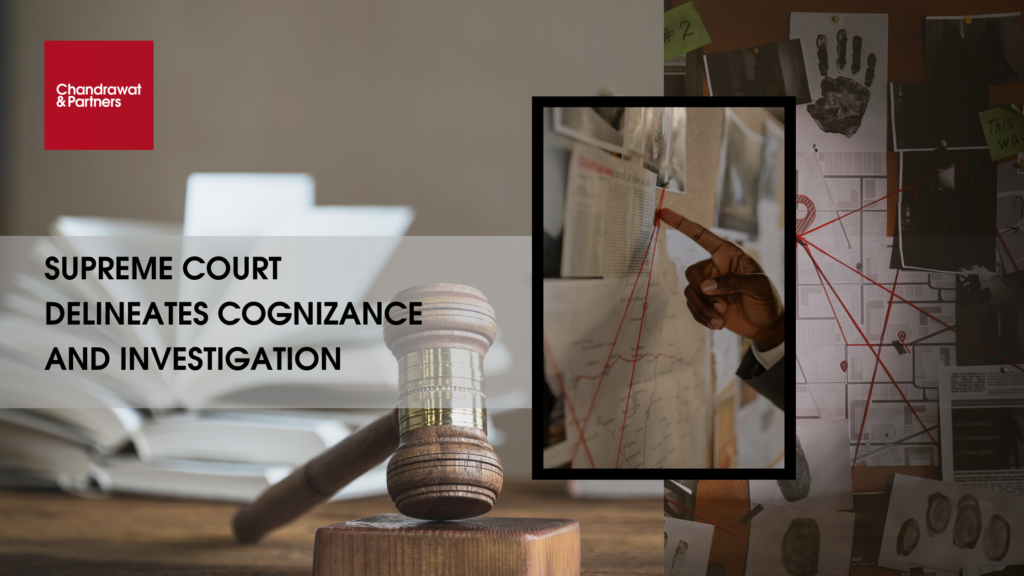
Share :
SUPREME COURT DELINEATES COGNIZANCE AND INVESTIGATION
In M/S Sas Infratech Pvt. Ltd. v. the State of Telangana & Anr., the Supreme Court has once again reiterated the crucial distinction between a Judicial Magistrate taking cognizance of an offense and an investigation by the police under Section 156(3) of the Code of Criminal Procedure,1973 (“CrPC”). This ruling reinforces the well-established principle of judicial restraint and serves as a reminder of the procedural safeguards enshrined in the CrPC.
THE PRESENT CASE AND THE HIGH COURT’S VIEW
In the present case, the Magistrate had perused the complaint, supporting documents, and submissions made by the complainant. After being prima facie satisfied, the Magistrate exercised judicial discretion and directed an investigation under Section 156(3) of the CrPC. The accused challenged this order before the High Court under Section 482 of the CrPC that provides for the inherent power of the High Court, and the High Court set aside the Magistrate’s order.
THE SUPREME COURT’S FINDING
The bench, reversed the findings of the High Court and clarified that when a Magistrate exercises judicial discretion and directs an investigation under Section 156(3) of the CrPC, they cannot be said to have taken cognizance of any offense. This stance is consistent with the Supreme Court’s previous rulings on the matter.
REVISITING THE DEVARAPALLI CASE
The judgment heavily relied on the landmark case of Devarapalli Lakshminarayana Reddy And Others v. V. Narayana Reddy And Others (1976), where the Supreme Court had held that when a Magistrate, in the exercise of their judicial discretion, directs an investigation under Section 156(3) of the CrPC, they cannot be said to have taken cognizance of any offense. The court had clarified that cognizance is taken only when the Magistrate follows the procedure under Chapter XV of the CrPC, particularly Sections 200 and onwards.
THE PRINCIPLE ESTABLISHED
This judgment reinforces the well-established principle that ordering an investigation under Section 156(3) of the CrPC does not constitute taking cognizance of an offense. It clarifies the Magistrate’s role and discretion in the initial stages of a criminal case, ensuring that the procedural safeguards enshrined in the CrPC are upheld.
The ruling also serves as a reminder to High Courts to exercise caution when interfering with Magistrates’ orders, particularly in cases where limited powers under Section 482 of the CrPC are invoked. It underscores the importance of respecting the hierarchy of courts and the delineation of their respective powers and jurisdictions.
By reiterating this distinction, the Supreme Court has provided clarity and guidance to the lower courts, ensuring that the principles of fair trial and due process are upheld. It also highlights the importance of adhering to the procedural requirements outlined in the CrPC, which are designed to safeguard the rights of the accused and ensure the proper administration of justice.
Furthermore, this judgment reinforces the principle of judicial restraint, emphasizing that courts should exercise their discretionary powers judiciously and avoid interfering with orders that are legally sound and within the ambit of the concerned authority’s jurisdiction.
THE SUPREME COURT’S RATIONALE
The Supreme Court observed that the High Court should not have exercised its discretionary powers under Section 482 of the CrPC in this case. It stated that the Magistrate’s order was “just, legal and proper,” and the High Court should not have interfered with it, especially while exercising limited powers under Section 482. Consequently, the Supreme Court allowed the complainant’s appeal and restored the Magistrate’s order directing a police investigation. The court held that “Such order (magistrate’s order) being just, legal and proper, the High Court should not have interfered with the same, more particularly while exercising limited powers under Section 482 of CrPC.”
UPHOLDING FAIR TRIAL AND DUE PROCESS
The Supreme Court’s recent judgment is a significant development in the realm of criminal jurisprudence. It not only clarifies the distinction between taking cognizance and ordering an investigation but also underscores the importance of adhering to established legal principles and procedures. This ruling will undoubtedly serve as a guiding light for lower courts, ensuring that the principles of fair trial, due process, and the rule of law are upheld in the administration of criminal justice. By reiterating this crucial distinction, the Supreme Court has reinforced the procedural safeguards enshrined in the CrPC, thereby upholding the fundamental rights of the accused and promoting the fair and impartial administration of justice.
For more information or queries, please email us at
enquiries@chandrawatpartners.com



